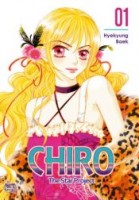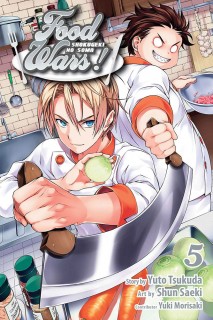My News and Reviews
Last week was another one-review week at Experiments in Manga, but I should hopefully be back to the normal swing of things again soon. (Though it does seem as though one review per week is the new normal… ) As for the review itself, I took a look at the first omnibus of Planetes, an excellent series about space exploration and development by Makoto Yukimura. I don’t tend to double-dip when it comes to manga (Planetes was originally released in English by Tokyopop), but Dark Horse has done such a nice job with the new edition that I couldn’t help myself. I really enjoy Planetes and am very glad to see it back in print.
In licensing news, Jay’s manga adaptation of the BBC’s television series Sherlock will be released in English by Titan. Elsewhere online, Kodansha Comics posted an interview with Hiro Mashima and Viz Media’s Shonen Jump posted an interview with Kohei Horikoshi. The OASG hosted an interesting light novel roundtable in which my Manga Bookshelf cohort Sean Gaffney participated. And the Toronto Comic Arts Festival announced its second wave of featured guests, which includes Shintaro Kago and Faith Erin Hicks among other great artists.
Quick Takes
 Chiro: The Star Project, Volume 1 by HyeKyung Baek. I picked up Chiro mainly for two reasons. The first was that the manhwa is one of Netcomics most recent releases. (Technically, it could even be considered a license rescue; Udon Entertainment published a few volumes of the series back in the day, which I also counted in its favor.) The second reason was that at some point Chiro apparently begins to play with gender in interesting ways. Unfortunately, this doesn’t happen in the first volume and there is nothing else that does happen in the first volume that would convince me to read any further. No matter what directions the series might eventually take, I really did not like the beginning of Chiro at all. The lead is incredibly self-conceited and self-absorbed and her actions frequently make no logical sense whatsoever. The plot, too, seems to be lacking any real direction at this point and ends up being a mess of unfortunate cliches and tropes. At times I think Baek is intentionally attempting to be off-the-wall and absurd, but the humor and the series as a whole just isn’t working for me.
Chiro: The Star Project, Volume 1 by HyeKyung Baek. I picked up Chiro mainly for two reasons. The first was that the manhwa is one of Netcomics most recent releases. (Technically, it could even be considered a license rescue; Udon Entertainment published a few volumes of the series back in the day, which I also counted in its favor.) The second reason was that at some point Chiro apparently begins to play with gender in interesting ways. Unfortunately, this doesn’t happen in the first volume and there is nothing else that does happen in the first volume that would convince me to read any further. No matter what directions the series might eventually take, I really did not like the beginning of Chiro at all. The lead is incredibly self-conceited and self-absorbed and her actions frequently make no logical sense whatsoever. The plot, too, seems to be lacking any real direction at this point and ends up being a mess of unfortunate cliches and tropes. At times I think Baek is intentionally attempting to be off-the-wall and absurd, but the humor and the series as a whole just isn’t working for me.
 Food Wars!: Shokugeki no Soma, Volumes 5-8 written by Yuto Tsukuda and illustrated by Shun Saeki. I tend to enjoy food manga, so it doesn’t really surprise me that I find Food Wars! to be entertaining. The fanservice is admittedly and purposefully ridiculous. People frequently lose their clothing not only figuratively but literally as their reactions to tasting exquisite food are nearly orgasmic. And there are plenty of delectable dishes to go around—these particular volumes bring to a conclusion the challenges of the school’s cooking camp and the beginning of the Fall Classic competition. One danger of a tournament-style manga like Food Wars! is the sheer number of characters that are introduced over the course of the series. Fortunately, Tsukuda and Saeki have so far managed to create a cast made up of characters who, while not necessarily being particularly nuanced or deep, are distinctive in their personalities and designs. Perhaps even more important is that they each have their own dramatic and over-the-top style of cooking. It’s especially interesting seeing the different approaches to cuisine pitted against one another.
Food Wars!: Shokugeki no Soma, Volumes 5-8 written by Yuto Tsukuda and illustrated by Shun Saeki. I tend to enjoy food manga, so it doesn’t really surprise me that I find Food Wars! to be entertaining. The fanservice is admittedly and purposefully ridiculous. People frequently lose their clothing not only figuratively but literally as their reactions to tasting exquisite food are nearly orgasmic. And there are plenty of delectable dishes to go around—these particular volumes bring to a conclusion the challenges of the school’s cooking camp and the beginning of the Fall Classic competition. One danger of a tournament-style manga like Food Wars! is the sheer number of characters that are introduced over the course of the series. Fortunately, Tsukuda and Saeki have so far managed to create a cast made up of characters who, while not necessarily being particularly nuanced or deep, are distinctive in their personalities and designs. Perhaps even more important is that they each have their own dramatic and over-the-top style of cooking. It’s especially interesting seeing the different approaches to cuisine pitted against one another.
 Horimiya, Volume 1 written by Hero, illustrated by Daisuke Hagiwara. Because I knew quite a few people who were very excited when Horimiya was first licensed I wanted to make a point to give the manga a try even though I didn’t really know much about it except for the fact that it was adapted from a webcomic. They were right to be excited—Horimiya is a delightfully sweet and charming series. The basic premise is similar to any number of other manga featuring a high school romance with quirky characters, but both the leads and Hagiwara’s execution of the story are so wonderful that I didn’t at all mind. At school, Hori presents herself as fashionable and upbeat, but she’s a bit frustrated with her family situation which requires her to be something of a homebody. Miyamura is a classmate whose reserved nature and social awkwardness hides the fact that he’s liberally tattooed and pierced. Neither of them are quite like the other expected but they fall into an easy and natural friendship with each other. I’m really looking forward to reading more of Horimiya. It’s cute, funny, and has a ton of heart.
Horimiya, Volume 1 written by Hero, illustrated by Daisuke Hagiwara. Because I knew quite a few people who were very excited when Horimiya was first licensed I wanted to make a point to give the manga a try even though I didn’t really know much about it except for the fact that it was adapted from a webcomic. They were right to be excited—Horimiya is a delightfully sweet and charming series. The basic premise is similar to any number of other manga featuring a high school romance with quirky characters, but both the leads and Hagiwara’s execution of the story are so wonderful that I didn’t at all mind. At school, Hori presents herself as fashionable and upbeat, but she’s a bit frustrated with her family situation which requires her to be something of a homebody. Miyamura is a classmate whose reserved nature and social awkwardness hides the fact that he’s liberally tattooed and pierced. Neither of them are quite like the other expected but they fall into an easy and natural friendship with each other. I’m really looking forward to reading more of Horimiya. It’s cute, funny, and has a ton of heart.

